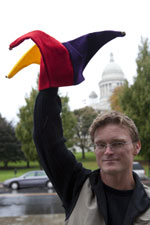My precise age at the time, I do not recall. It must have been seventh or eighth grade, because I remember middle school conversations attempting to express my thoughts, and middle school covered seventh to ninth grades, in my district. I know that I had recently reached the age at which, although still a child myself, I was beginning to have responsibility for younger kids on Boy Scout campouts, because part of what turned those periodic adventures sour was the discomfort that my leniency toward them caused me.
What I remember very distinctly is sitting in my room as the Friday sun set over the apartment building outside my window, ushering the night-time slide into Saturday, on which day I would drag myself out into the chilly woods again. The minimal comfort that I could concoct for myself was the knowledge that within a couple of days, I would be right back in my warm room. Indeed, if I expended enough imagination, I could just about feel myself to be in that moment, replete with memories of a weekend already past.
And that's when it hit me. ("Occurred to me" wouldn't be a sufficiently violent phrase.) Just as I could almost obtain through focus that future after an unpleasant period, I could extend my visualization all the way to the day of my death. Just as I would soon be sitting in my bedroom chair looking back on a few days, so too would I eventually be lying somewhere looking back on my life.
As I recall, it took me better than a year to work my way through that dark epiphany — to a sense of normalcy. I learned well, during that period, how abnormalcy, to turn a phrase, can feed on itself. In moments of tranquility, reflexive revelry that The Feeling had gone would inevitably bring it crashing back.
Why it finally subsided, I don't think I've ever understood, but the experience laid the groundwork for a subsequent revelation: We must go through the present to get to the future, and if we're to keep our frustration with current circumstances from infecting vulnerable yet-to-comes, while forbidding the inexorable elision of time (toward a day when now will be then) from making now seem an illusion, we must simultaneously find those treasures that every moment must hold, even as we pick our way among life's brambles toward circumstances that are more conducive to our well-being.
In short, it is possible, even necessary, to find pleasure in life as it stands while keeping an eye on such aspects as we'd like to discard over time. This objective only begins to seem a conundrum from within a materialist view of reality. If we've an unknowably limited amount of time in which to accomplish goals, then the stresses and setbacks involved in reaching them can consume the contentment of progress, and a lack of progress takes on the mien of a life wasted. Conversely, if our solution is to let life wash over us in the present, then the notion of long-term objectives becomes moot; sustained pleasure and rapid gratification rule the day.
With the allowance of God into one's philosophy — defining Him, most essentially, as the being who lends intentionality to reality — comes a model for understanding the long view of life. In God, we see a perspective wherein all time is concurrent. It is as if, in my pubescent imaginings of the day after a weekend of discomfort, both the moment of mild dread and the moment of relieved return were simultaneous. So too would be the experience of raw-handed dish-washing in the forest, and as just another experience during a life in motion toward eternity with God, it would hardly be worthy of dread.
What remains, for us creatures trapped in time, is to master our animal impulsiveness. Any given instant may have only the pleasure of lessons being learned, or of victory over instinct. The more tangible good-feeling comes in retrospect, when one day an experience allows us to connect with fellow human beings or when dogged labor produces its rewards or when we fall into dreadful circumstances that would have proven unbearable but for well rehearsed and internalized perseverance.
In my theological understanding of the universe, any moment that could conceivably be will be, the question being whether the courses of our lives lead us there. It is enough, taking that to be the case, that we can imagine the good use of hard-earned experience or the fruits of any given seeds that we might sow, because in the vista of omnipresence, those fruits appeared the moment they were sown, even if we never have the good fortune to enjoy them.


| Sun | Mon | Tue | Wed | Thu | Fri | Sat |
|---|---|---|---|---|---|---|
| 1 | ||||||
| 2 | 3 | 4 | 5 | 6 | 7 | 8 |
| 9 | 10 | 11 | 12 | 13 | 14 | 15 |
| 16 | 17 | 18 | 19 | 20 | 21 | 22 |
| 23 | 24 | 25 | 26 | 27 | 28 | 29 |
| 30 |